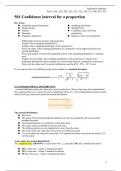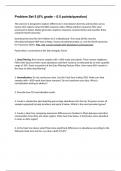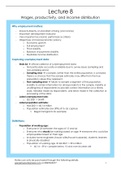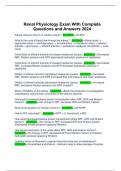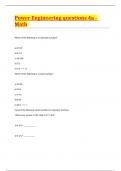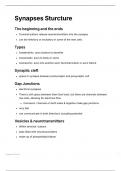Contract Law - Lecture 2
Acceptance and Consideration
Acceptance
- “A nal and unquali ed expression of assent to the terms of an o er” (assessed objectively)
• Is there actual nal and unquali ed assent? / The fact of acceptance
• Has this been communicated to the o eror? / Communication of acceptance to the o erer
Use of the post
- In the past (200 years ago), post/telegram was the best form of communication
- The post is non-instantaneous, a letter is not instant
- Should acceptance be ruled to be communicated on receipt or on sending?
- Either way one party (o eror or o eree) will be disadvantaged
- Consider: faxes, emails, online forms…
- In English law, acceptance is formed when the o erer has received the acceptance but this isn’t
applied with post, a contract is formed on sending but there are exceptions
Acceptance must be communicated
- A good sense rule with exceptions:
• The rule will not apply when the reason for lack of communication is due to negligence on the
part of the o eror - if the o eror doesn’t know about the communication or hasn’t received
acceptance it is their fault, he can’t escape the contract because he didn’t know about
acceptance
• The rule may not apply when the post is used
• The o eror may waive the requirement to communicate, the o eror might make it clear in the
o er that you don’t need to make acceptance. (especially in unilateral contexts)
“The rule of receipt”
- The rule that the o erer must have the acceptance, the acceptance must have been
communicated to the o erer to form a contract
- Entores v Miles Far East Corporation [1955] 2 QB 327
• The problem before Lord Denning was a contract between two di erent countries,
Netherlands and Britain. Acceptance was not in dispute but the time in which it took place
• Acceptance was sent by telex (email) from Amsterdam to a machine in London – where was
the contract formed?
• Where and when the contract was formed is important as it determines which countries legal
system applies
• Lord Denning on conversations, telephones and telexes, failed ink on a teleprinter: The “rule of
receipt”
- Modern analogues? Consider email, etc.
- Brinkibon Ltd v Stahag-Stahl und Stahlwarenhandelsgesellschaft mbH [1983] 2 AC 34:
Concerned a contract between Austria and London. Determined that acceptance depends on
commercial circumstances, sending an email at 5pm in London will mean there is a time delay
due to time di erences.
• When has the o erer had a reasonable time of communication - e.g not checking work emails
outside of work hours
- No universal rule can cover such cases – per Lord Wilberforce
• The Brimnes [1975] QB 929
The postal rule
- Acceptance is communicated once the letter has been sent
- Adams v Lindsell (1818) 1 B & Ald 681: Lindsell had sent a letter to Adams o ering to sell him
wool, the letter said he would o er the wool for X amounts of money and please reply by return
of post. Lindsell had sent the letter incorrectly and it arrived to Adams 5 days later than it
should have done. Lindsell sold the wool to someone else as he hadn’t heard from Adams.
Adam’s received the letter and returned a letter to Lindsell accepting the o er of wool but by
this time it was too late as Lindsell had already received the wool. Lindsell argued that a
contract was only formed once HE had received the letter back. Adam argued that a contract
had been formed because it was Lindsell’s fault that he incorrectly posted the letter and that he
owed him the wool. The court ruled in favour of Adams and said that in these circumstances
the delay was caused by Lindsell and he cant escape the contract.
- Con rmed Dunlop v Higgins (1848) 1 HLC 381
ff fi fiff ff fffiff fffi ffff ff fiff ff ff ff ff ffff ff ff ff
, Contract Law - Lecture 2
Acceptance and Consideration
- Applies even where the letter is lost (Household Fire and Carriage Accident Insurance Co
Ltd v Grant (1879) 4 Ex D 216)
- What possible justi cation is there for the postal rule?
Justi cations
1. The Adams v Lindsell justi cation (preventing an ‘in nity of letters’)
2. The Post O ce as common agent for both parties
3. Ease of proof
4. Balances power between o eror and o eree
5. Arbitrary?
Context
- Death of the postal rule? Not many contracts are formed by post in the modern day
• Thomas v BPE Solicitors (a rm) [2010] EWHC 306 (Ch)
• Chwee Kin Keong v Digilandmall.com Pte Ltd [2004] 2 SLR(R) 594
- Gardner, “Trashing with Trollope: A Deconstruction of the Postal Rules in Contract” (1992)
12 OJLS 170: makes a comment that in the 19th century the post was a new thing, this idea
that you could post a letter for a penny and a person could get it was a new technological
advance.
Gradual erosion
- The postal rule will only apply when use of the post is contemplated by the parties, when both
parties are expecting to use the post
• Henthorn v Fraser [1892] 2 Ch 27 - concerned a contract formed between two di erent
towns on di erent sides of a river. The court held that an o eror can expressly or impliedly
exclude the postal rule.
- The o eror may expressly or impliedly exclude its application
• Holwell Securities Ltd v Hughes [1974] 1 WLR 155 - The judge said that the rule does not
operate if it would produce “manifest inconvenience and absurdity”
Bilateral and unilateral contracts
- Bilateral: both parties are promising something
- Unilateral: one party is promising something if the other party does something else
- Rewards
Unilateral context
- The o eror in a unilateral context may (impliedly) waive requirement to communicate (consider
Carlill, Lefkowitz, etc.)
- This gives rise to certain complexities for both o eror and o eree
Acceptance of unilateral o ers
• Consider Carlill – what would have happened if the Carbolic Smoke Ball Co had withdrawn
their o er?
• The famous walk from London to York - rewards for completing a task
Implied obligation on the o eror?
- Comments have been made by judges that once an unilateral o er has been made and
someone has started to accept it then the o er cannot be withdrawn
• Go LJ in Daulia Ltd v Four Millbank Nominees Ltd [1978] Ch 231
• Denning LJ in Errington v Errington [1952] 1 KB 290
Recap
- O er and acceptance is required for agreement
- Ultimately this is a matter of assessing:
• Whether the o eror intended to be bound by his “o er”
• Whether the o eree actually accepted the o er
• Whether acceptance was communicated
ffff fiffff
ffi
ff ff fi fiffffff fi ff ff ff fffi ffff ff ff
Acceptance and Consideration
Acceptance
- “A nal and unquali ed expression of assent to the terms of an o er” (assessed objectively)
• Is there actual nal and unquali ed assent? / The fact of acceptance
• Has this been communicated to the o eror? / Communication of acceptance to the o erer
Use of the post
- In the past (200 years ago), post/telegram was the best form of communication
- The post is non-instantaneous, a letter is not instant
- Should acceptance be ruled to be communicated on receipt or on sending?
- Either way one party (o eror or o eree) will be disadvantaged
- Consider: faxes, emails, online forms…
- In English law, acceptance is formed when the o erer has received the acceptance but this isn’t
applied with post, a contract is formed on sending but there are exceptions
Acceptance must be communicated
- A good sense rule with exceptions:
• The rule will not apply when the reason for lack of communication is due to negligence on the
part of the o eror - if the o eror doesn’t know about the communication or hasn’t received
acceptance it is their fault, he can’t escape the contract because he didn’t know about
acceptance
• The rule may not apply when the post is used
• The o eror may waive the requirement to communicate, the o eror might make it clear in the
o er that you don’t need to make acceptance. (especially in unilateral contexts)
“The rule of receipt”
- The rule that the o erer must have the acceptance, the acceptance must have been
communicated to the o erer to form a contract
- Entores v Miles Far East Corporation [1955] 2 QB 327
• The problem before Lord Denning was a contract between two di erent countries,
Netherlands and Britain. Acceptance was not in dispute but the time in which it took place
• Acceptance was sent by telex (email) from Amsterdam to a machine in London – where was
the contract formed?
• Where and when the contract was formed is important as it determines which countries legal
system applies
• Lord Denning on conversations, telephones and telexes, failed ink on a teleprinter: The “rule of
receipt”
- Modern analogues? Consider email, etc.
- Brinkibon Ltd v Stahag-Stahl und Stahlwarenhandelsgesellschaft mbH [1983] 2 AC 34:
Concerned a contract between Austria and London. Determined that acceptance depends on
commercial circumstances, sending an email at 5pm in London will mean there is a time delay
due to time di erences.
• When has the o erer had a reasonable time of communication - e.g not checking work emails
outside of work hours
- No universal rule can cover such cases – per Lord Wilberforce
• The Brimnes [1975] QB 929
The postal rule
- Acceptance is communicated once the letter has been sent
- Adams v Lindsell (1818) 1 B & Ald 681: Lindsell had sent a letter to Adams o ering to sell him
wool, the letter said he would o er the wool for X amounts of money and please reply by return
of post. Lindsell had sent the letter incorrectly and it arrived to Adams 5 days later than it
should have done. Lindsell sold the wool to someone else as he hadn’t heard from Adams.
Adam’s received the letter and returned a letter to Lindsell accepting the o er of wool but by
this time it was too late as Lindsell had already received the wool. Lindsell argued that a
contract was only formed once HE had received the letter back. Adam argued that a contract
had been formed because it was Lindsell’s fault that he incorrectly posted the letter and that he
owed him the wool. The court ruled in favour of Adams and said that in these circumstances
the delay was caused by Lindsell and he cant escape the contract.
- Con rmed Dunlop v Higgins (1848) 1 HLC 381
ff fi fiff ff fffiff fffi ffff ff fiff ff ff ff ff ffff ff ff ff
, Contract Law - Lecture 2
Acceptance and Consideration
- Applies even where the letter is lost (Household Fire and Carriage Accident Insurance Co
Ltd v Grant (1879) 4 Ex D 216)
- What possible justi cation is there for the postal rule?
Justi cations
1. The Adams v Lindsell justi cation (preventing an ‘in nity of letters’)
2. The Post O ce as common agent for both parties
3. Ease of proof
4. Balances power between o eror and o eree
5. Arbitrary?
Context
- Death of the postal rule? Not many contracts are formed by post in the modern day
• Thomas v BPE Solicitors (a rm) [2010] EWHC 306 (Ch)
• Chwee Kin Keong v Digilandmall.com Pte Ltd [2004] 2 SLR(R) 594
- Gardner, “Trashing with Trollope: A Deconstruction of the Postal Rules in Contract” (1992)
12 OJLS 170: makes a comment that in the 19th century the post was a new thing, this idea
that you could post a letter for a penny and a person could get it was a new technological
advance.
Gradual erosion
- The postal rule will only apply when use of the post is contemplated by the parties, when both
parties are expecting to use the post
• Henthorn v Fraser [1892] 2 Ch 27 - concerned a contract formed between two di erent
towns on di erent sides of a river. The court held that an o eror can expressly or impliedly
exclude the postal rule.
- The o eror may expressly or impliedly exclude its application
• Holwell Securities Ltd v Hughes [1974] 1 WLR 155 - The judge said that the rule does not
operate if it would produce “manifest inconvenience and absurdity”
Bilateral and unilateral contracts
- Bilateral: both parties are promising something
- Unilateral: one party is promising something if the other party does something else
- Rewards
Unilateral context
- The o eror in a unilateral context may (impliedly) waive requirement to communicate (consider
Carlill, Lefkowitz, etc.)
- This gives rise to certain complexities for both o eror and o eree
Acceptance of unilateral o ers
• Consider Carlill – what would have happened if the Carbolic Smoke Ball Co had withdrawn
their o er?
• The famous walk from London to York - rewards for completing a task
Implied obligation on the o eror?
- Comments have been made by judges that once an unilateral o er has been made and
someone has started to accept it then the o er cannot be withdrawn
• Go LJ in Daulia Ltd v Four Millbank Nominees Ltd [1978] Ch 231
• Denning LJ in Errington v Errington [1952] 1 KB 290
Recap
- O er and acceptance is required for agreement
- Ultimately this is a matter of assessing:
• Whether the o eror intended to be bound by his “o er”
• Whether the o eree actually accepted the o er
• Whether acceptance was communicated
ffff fiffff
ffi
ff ff fi fiffffff fi ff ff ff fffi ffff ff ff


